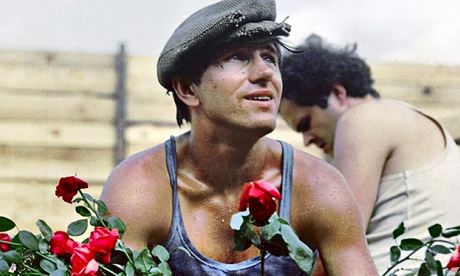
A major milestone in Polish cinema, Man of Marble comes from a period of political thaw, moderate affluence and agonised self-questioning between the end of hardline postwar Stalinism in the 1950s and the return of authoritarianism, which culminated in the imposition of martial law in 1981.
Contemplated by Andrzej Wajda ever since he completed his war trilogy in 1959, and much influenced by Citizen Kane, it features the movie debut of the charismatic 25-year Krystyna Janda as tough, chain-smoking film-school student Agnieszka, dressed in flared jeans and denim jacket. She's working on her graduation project, a controversial documentary in the then fashionable American cinéma vérité style. ("No tripods, just hand-held cameras and wide-angle lens," she tells her middle-aged cameraman.) Its subject is Mateusz Birkut (Jerzy Radziwiłowicz), a long-forgotten Stakhanovite bricklayer who became a Stalinist hero, the focus of propagandist documentaries, and then disappeared into obscurity, a victim of the system.
While battling with self-serving media bureaucrats, Agnieszka reconstructs Mateusz's career and times through old documentaries, suppressed footage and interviews with colleagues, friends and film-makers, brilliantly woven together to create the portrait of a man of simple decency involved in complex times. It's a long, riveting exploration, bitterly comic, utterly convincing, as exciting as a thriller and one of the best records we have of its time.
Man of Marble revived Wajda's reputation and gave him new purpose, and it inspired the careers of Krzysztof Zanussi, Agnieszka Holland, Krzysztof Kieślowski and Ryszard Bugajski as film-makers. It made Janda a new feminist icon of arthouse cinema and was a major contribution to movies about movie-making. It anticipated the Solidarity movement and the revolution in the Gdańsk shipyards. Its sequel, Man of Iron, reunited Janda and Radziwilowicz (now playing Mateusz's son) in Gdańsk, where Lech Wałęsa is a witness at their wedding, and it won the 1981 Palme d'Or at Cannes. Like several key Polish films of the time it was banned, and Wajda went into exile. This DVD of Man of Marble is accompanied by recent interviews with Wajda and Janda.

